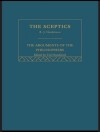This book seeks to explain the divergent political pathways of twenty six post-communist states, following the breakdown and eventual collapse of communism in 1989-1991. Considering the trajectories of individual states between 1990 – 2007, this book challenges two central bodies of theory relating to democratization and regime change. Through a sustained analysis of global and post-communist developments within this time period, the author shows that claims of an increasing asymmetry between the ‘electoral’ and ‘liberal’ elements of modern democracy have been greatly exaggerated. The author goes on to contend that in accounting for the geographical dispersion of post-communist regime forms, deeper structural factors should be considered as crucial. The book is divided into the following parts: Part I demonstrates how different conceptualisations of democracy can lead to very different conclusions about the empirical dynamics of democratization. Part II contrasts different explanations of post-communist political change and provides an integrated framework for explaining the political pathways encountered within the former Eastern Bloc. This book will be of interest to students and scholars of post-communist studies, democratization studies, comparative politics and regime change.
Jorgen Moller
Post-communist Regime Change [PDF ebook]
A Comparative Study
Post-communist Regime Change [PDF ebook]
A Comparative Study
Bu e-kitabı satın alın ve 1 tane daha ÜCRETSİZ kazanın!
Dil İngilizce ● Biçim PDF ● Sayfalar 192 ● ISBN 9781134014880 ● Yayımcı Taylor and Francis ● Yayınlanan 2009 ● İndirilebilir 3 kez ● Döviz EUR ● Kimlik 4298874 ● Kopya koruma Adobe DRM
DRM özellikli bir e-kitap okuyucu gerektirir












